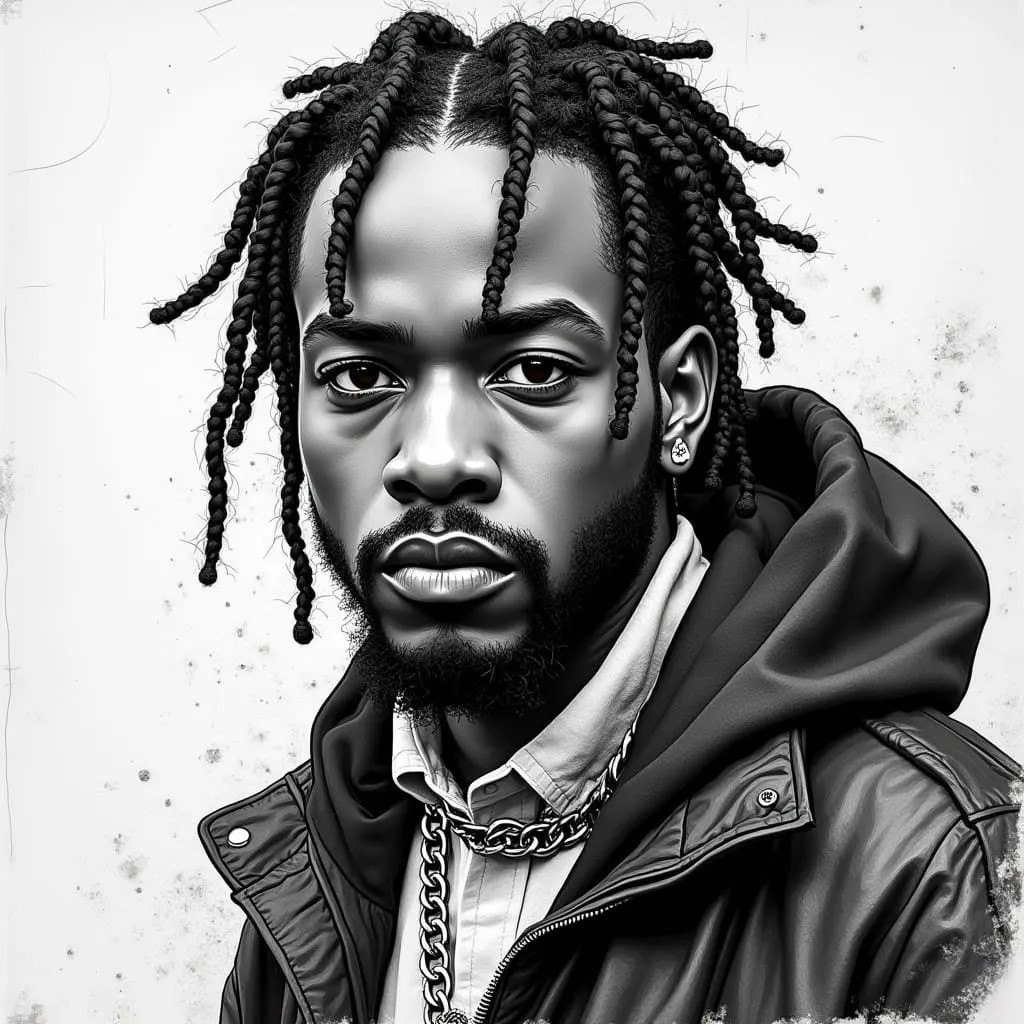The voice of a generation, weaving tales of struggle, hope, and redemption through the powerful medium of hip-hop. Kendrick Lamar Duckworth, known to the world as Kendrick Lamar, has been a dominant force in the music industry since his major-label debut in 2012. With a unique blend of storytelling, socially conscious commentary, and personal introspection, Kendrick has carved out a niche for himself as one of the most respected and beloved figures in contemporary music.
Born in Compton, California, in 1987, Kendrick grew up surrounded by the harsh realities of gang violence, poverty, and systemic racism. These experiences would later shape the narrative of his music, as he sought to convey the complexities and challenges of life in the inner city. Kendrick’s early life was marked by exposure to hip-hop, with his father, Kenny Duckworth, introducing him to the genre and encouraging his creative pursuits. This foundation would eventually lead Kendrick to develop his own unique style, which blends the lyrical dexterity of Tupac Shakur with the jazz-infused production of Dr. Dre.
Kendrick’s rise to fame began with the release of his debut album, “Section.80,” in 2011. Although the album received critical acclaim, it was his major-label debut, “good kid, m.A.A.d city,” that brought him widespread recognition. Released in 2012, the album was a commercial success, and its narrative-driven approach, which explored themes of adolescence, peer pressure, and self-discovery, resonated with listeners from diverse backgrounds. The album’s lead single, “Swimming Pools (Drank),” became a breakout hit, and its accompanying music video, which addressed the dangers of alcohol abuse, further solidified Kendrick’s reputation as a thoughtful and innovative artist.
The subsequent years saw Kendrick continue to push the boundaries of hip-hop, experimenting with new sounds, themes, and collaborative partnerships. His 2015 album, “To Pimp a Butterfly,” was a landmark release, featuring a fusion of jazz, funk, and spoken word elements. The album’s lyrics tackled topics such as black empowerment, self-love, and the exploitation of African American culture, cementing Kendrick’s status as a leading voice in the conversation about social justice and racial equality.
One of the defining characteristics of Kendrick’s music is his ability to balance personal storytelling with broader social commentary. His songs often feature vivid descriptions of life in Compton, where he grew up, but also address universal themes like love, family, and the search for identity. This blend of specificity and universality has allowed Kendrick to connect with listeners from diverse backgrounds, making him one of the most relatable and respected figures in contemporary music.
In addition to his musical accomplishments, Kendrick has also made a significant impact on the world of social justice. His music has been featured in various documentaries, films, and television shows, and he has used his platform to speak out on issues like police brutality, systemic racism, and economic inequality. In 2016, Kendrick was awarded the Pulitzer Prize for Music for his album “DAMN.,” becoming the first non-jazz or classical musician to receive the honor.
As we look to the future, it is clear that Kendrick Lamar will continue to be a driving force in the music industry. His forthcoming projects, including a rumored new album and various collaborations with other artists, are highly anticipated, and his influence can be seen in the work of countless other musicians, from J. Cole to Chance the Rapper. Whether he is pushing the boundaries of hip-hop, exploring new themes and ideas, or using his platform to advocate for social justice, Kendrick Lamar remains an essential voice in the cultural conversation, and his music will undoubtedly continue to inspire, educate, and uplift listeners for generations to come.
What is the significance of Kendrick Lamar's album "To Pimp a Butterfly"?
+"To Pimp a Butterfly" is widely regarded as a landmark album in Kendrick Lamar's discography, featuring a fusion of jazz, funk, and spoken word elements. The album's lyrics tackle topics such as black empowerment, self-love, and the exploitation of African American culture, cementing Kendrick's status as a leading voice in the conversation about social justice and racial equality.
How has Kendrick Lamar's music impacted the hip-hop genre?
+Kendrick Lamar's music has had a profound impact on the hip-hop genre, inspiring a new generation of artists to explore more nuanced and thoughtful approaches to storytelling. His commitment to social justice and his willingness to address complex issues in his music have made him a role model for young people around the world.
What is the meaning behind Kendrick Lamar's album title "DAMN."?
+The title "DAMN." is a reflection of Kendrick Lamar's emotions and thoughts on the state of the world. The album's lyrics explore themes of faith, morality, and the search for meaning in a chaotic world. The title is also a play on words, referencing the idea that we are all damned to repeat the same mistakes and patterns of behavior until we learn from them.
Kendrick Lamar’s legacy continues to evolve, with each new release and project pushing the boundaries of what is possible in hip-hop. As a cultural icon, he remains a powerful symbol of hope, creativity, and resilience, inspiring countless young people around the world to find their voice and tell their own stories. Through his music, Kendrick has created a sense of community and connection, reminding us that even in the darkest of times, there is always the possibility for transformation, redemption, and renewal.



